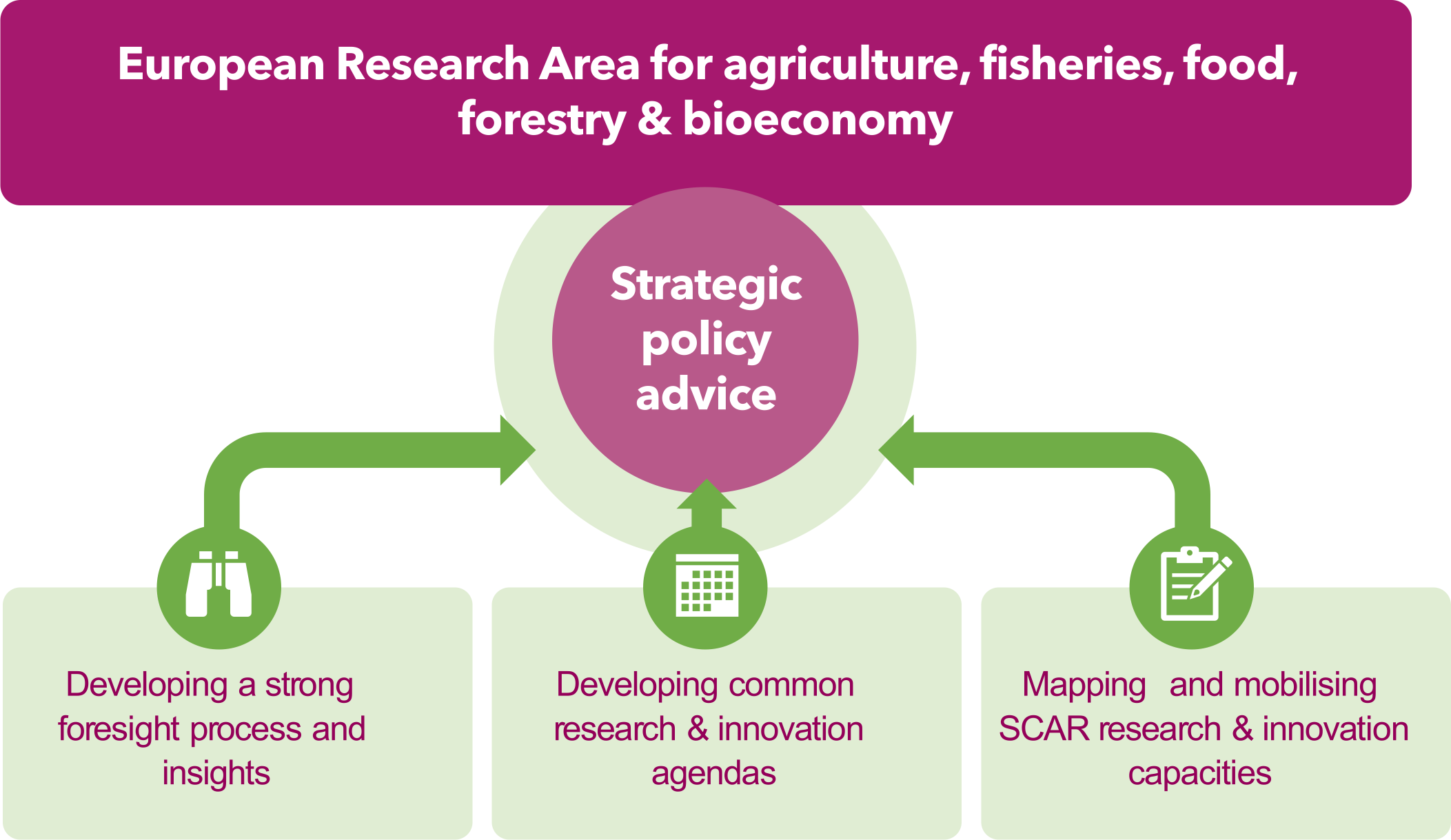

SCAR plays an important role in establishing a European Research Area with a common agricultural and wider bioeconomy research agenda including fisheries (SCAR Fish), which enhances cooperation, coordination, and information exchange between the Member States through four main activities:

Through all its activities and with its various instruments, SCAR’s most essential output is research and innovation related policy advice. In forming the advice, the increasing role of SCAR Working Groups can be traced. Examples include:
To cope with the wide range of complex and interlinked challenges facing agriculture and the wider bioeconomy, the use of foresight is important in ensuring that the right research questions are asked. Strongly encouraged by the EU Council, SCAR has launched five separate foresight exercises since 2005 which have identified possible futures scenarios for European agriculture and the wider bioeconomy as the basis for prioritising research and other activities in the medium to long term. Each foresight report has been accompanied by a dedicated conference aimed at disseminating results and providing a platform for discussing the key foresight messages. Foresight conclusions and recommendations have been used by the Commission and MS/AC in planning research coordination activities.
| SCAR Foresight Process | ||
| 2006-7 | 1st Foresight Exercise - Disruption Scenarios Towards future challenges of Agricultural Research in Europe - Key messages for research priority setting |
CWG Agriculture & Climate Change JPI FACCE and HDHL CWG Agriculture & Energy |
| 2008-9 | 2nd Foresight Exercise - Resilience and Crisis Sustainable development - a challenge for European Research |
AKIS EIP-A |
| 2010-11 | 3rd Foresight Exercise - Productivity and Sufficiency Transition towards sustainable food consumption and production in a resource constrained world |
SWG Forest R&I SWG Sustainable Biomass SCAR-Fish |
| 2014-15 | 4th Foresight Exercise - Sustainable Agriculture, Forestry and Fisheries in the Bioeconomy | Infographic poster |
| 2019-2020 | 5th Foresight Exercise – Resilience and Transformation Natural resources and food systems: transitions towards a ‘safe and just’ operating space |
|
Since 2005, more than 20 CWGs/SWGs have been set up by European countries engaging voluntarily and on a variable-geometry basis in the definition, development and implementation of common research agendas based on a common vision of how to address major challenges in the field of agriculture, food systems, fisheries, forestry and the wider bioeconomy. The dynamism and commitment of several CWGs paved the way for participation in the FP7 ERA-NET scheme. Eight of them became ERA-NETs.
In the same logic as for ERANETs, SCAR has been highly active and influential in the Joint Programming process proposed by the European Commission in 2008 to further promote research alignment and common agendas. In 2010 the Commission adopted two recommendations for Joint Programming Initiatives: "Agriculture, Food Security and Climate Change" (FACCE) and "A Healthy Diet for a Healthy Life" (HDHL), both of which were underpinned by SCAR activities. FACCE and HDHL have since developed several Strategic Research Agendas and have provided a framework for the alignment of existing programmes and joint research efforts to achieve the objectives of their respective areas.
Under Horizon Europe, several of the Strategic Research & Innovation Agendas (SRIAs) for the candidate European Partnerships were developed within SCAR Working Groups. A SRIA is a partnership’s strategy document, identifying its objectives, impact areas and expected outcomes, portfolio of activities, outputs, and milestones within a certain timeline (ERA-LEARN, 2024) Examples include the SRIAs created for the European Partnership on Sustainable Food Systems, the European Partnership on Agroecology, and the European Partnership on Animal Health and Welfare.
Preliminary to any potential joint activity, an adequate mutual knowledge of activities, institutions and facilities in Member States and Associated Countries is needed. SCAR agreed that mapping activities should be carried out by building on the EU AGRI-MAPPING project from the FP6 SSP-4 call “Mapping and foresight of the EU agricultural research capacity”. A project was negotiated in cooperation with SCAR towards the delivery of a mapping report on European capacities in the field of agricultural research and recommendations on development that would be desirable in the enlarged Europe by 2020.
In 2008, SCAR established the Collaborative Working Group (CWG) on 'Shared Infrastructures for European Agri-Food Research' to bring about increased collaboration between Member States and Associated Countries, exploit potential synergies, look for efficiency gains, eliminate redundancies, and make budgetary savings through the eventual sharing of EU infrastructures. The group provided a comprehensive analysis of short-comings, gaps, obstacles and needs and suggested possible solutions and approaches for overcoming existing difficulties for addressing future challenges.
In addition to these initiatives most of the CWGs and ERA-Nets carried out their own sector driven mapping exercises which are essential to formulating eventual joint programming exercises. These mapping exercises need to evolve into more dynamic and analytical real time interactive approaches which can engage the right stakeholders and demonstrate palpable follow-up leading to a better alignment of national programmes and gap analysis.